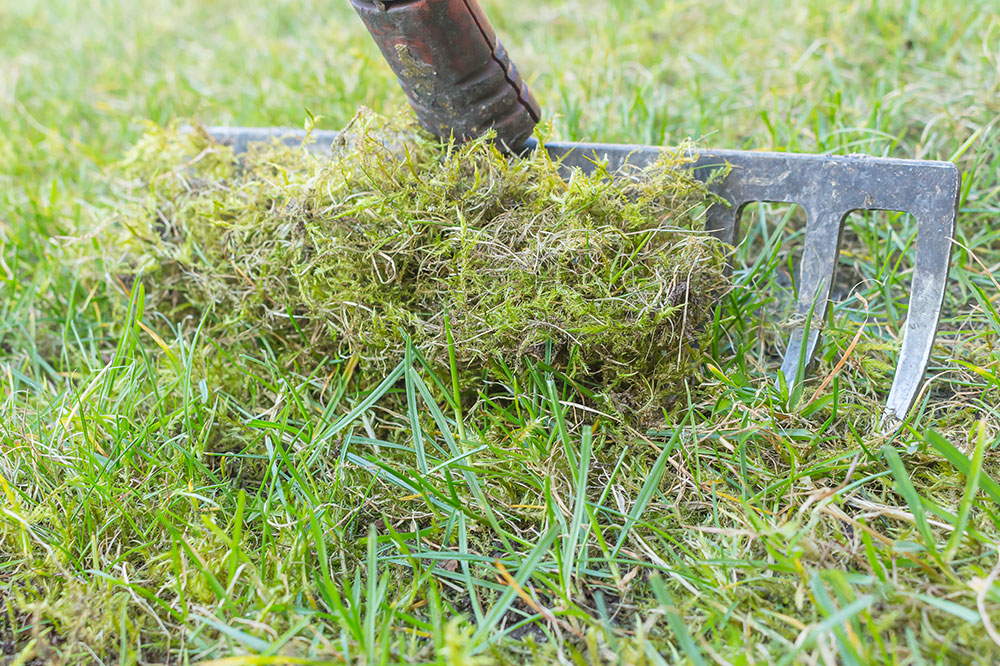4 Easy Ways to Get Rid of Moss in the Lawn
Moss is a small, soft, flowerless plant that grows in damp areas, especially after rain. It thrives on moisture and tends to grow and spread quickly in lawns with poor drainage. It can even spread in lawns with unhealthy soil. Initially, moss may appear attractive, but if left unchecked, it can cover the entire lawn and obstruct the grass from growing. Fortunately, it is quite easy to remove moss, as it is a shallow-rooted plant.
Causes of moss in the lawn
Before knowing about the natural way of getting rid of moss, one must know the causes of it.
- Insufficient drainage
The buildup of water on the surface of the grass is one of the main reasons for moss invasion.

- Lack of regular maintenance
A neglected or improperly cared for grass might create the ideal setting for moss growth. Regular garden upkeep, such as scarifying and aeration is necessary to maintain the health of your lawn and avoid moss growth. The unhealthy grass may amplify the growth of moss.
- Improper mowing techniques
Your grass may become thin and frail if mowed too short during the growing season.
Natural moss-removal methods
Excessive moss can indicate more serious issues, such as poor drainage, compacted soil, insufficient sunlight, or low pH. Unlike other undesirable lawn weeds and more sophisticated plants, moss does not require water or nutrients to survive, making moss control a difficult operation.
Due to this, moss is resistant to both conventional weed killers and organic weed killers that are suitable for all plant varieties. Getting rid of moss in the lawn when it is actively developing is the first step in controlling and eliminating it.
- Use baking soda
It is the easiest and most effective way to eliminate moss. Since this procedure is all-natural, it won’t harm the environment or your garden plants, soil, or water. It works well for smaller patches of moss or even crabgrass. - Understand pH scale and apply lime
The pH level of your soil is responsible for grasses to thrive and it plays a crucial role in moss living freely in your lawn. The most precise technique to measure the pH level of your soil is with a multifunctional soil meter. Neutral soils have a pH value between 6.5 and 7.5. When the pH value is less than 5.5, it is extremely acidic and alkaline over 7.5.Applying lime to your lawn will increase the pH of your soil. Lime will not harm your grass, but when used appropriately, it will balance the soil’s acidity and help it obtain its ideal pH level. The optimum time to add lime to your soil is autumn and spring. While pelletized lime will adjust the soil pH almost immediately, ordinary lime can take months to produce noticeable results. Use a lawn spreader to distribute lime to your grass and water your lawn after applying the lime to help it start working. - Try dethatching and raking
If your moss problem is minor, you can try raking it up and loosening it up by attacking it from several angles. For a quicker fix, use a power rake, a gas-powered instrument that can remove thatch and moss, or fit your lawnmower with a dethatching blade.
- Make space for sunlight
Your location and the grass type will determine how much sun your lawn requires. On average, most lawns require 4-6 hours of direct sunlight daily. Trim back branches if they cover a significant portion of your grass in shadow. You can also switch to cultivating grass that grows better in the shade, such as tall fescue.
Things to consider before hiring moss-removal services
If natural methods don’t work, you may hire a professional. The moss-removal service provider must provide value for the money you pay them. Here are a few factors to consider while selecting a service provider.
- Usage of modern tools
Advanced tools can make the procedure to get rid of moss in the lawn effortless and save time. Check whether the service provider is equipped with the required tools. - Skilled technicians
Well-trained experts do the job efficiently and offer outstanding customer support. - Superior service
Pick a reliable company with solid reputation. Read reviews of their services and then book an appointment.
Chemical moss killers like herbicides can be dangerous and only temporarily affect moss, so it is strongly advised that you avoid them. There are various other options you can attempt for natural moss removal. Once you’ve figured out the best way to remove moss from your lawn organically, you must also take the appropriate precautions to prevent it from returning. Consulting a trusted service provider can also ease your efforts and help you get rid of moss from your lawn effectively.

